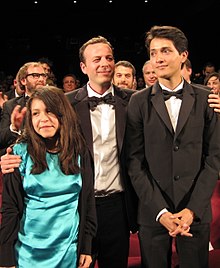
Mexican cinema dates to the late nineteenth century during the rule of President Porfirio Díaz. Seeing a demonstration of short films in 1896, Díaz immediately saw the importance of documenting his presidency in order to present an ideal image of it. With the outbreak of the Mexican Revolution in 1910, Mexican and foreign makers of silent films seized the opportunity to document its leaders and events. From 1915 onward, Mexican cinema focused on narrative film.
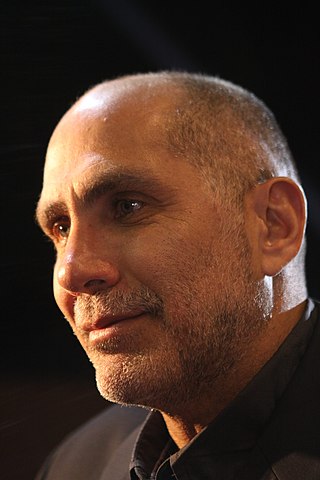
Guillermo Arriaga Jordán is a Mexican novelist, screenwriter, director and producer. Self-defined as "a hunter who works as a writer," he is best known for his Academy Award for Best Original Screenplay and BAFTA Award for Best Original Screenplay nominations for Babel and his screenplay for The Three Burials of Melquiades Estrada, which received the 2005 Cannes Best Screenplay Award.

Nuevo Cine Mexicano, also referred to as New Mexican Cinema is a Mexican film movement started in the early 1990s. Filmmakers, critics, and scholars consider Nuevo Cine Mexicano a "rebirth" of Mexican cinema because of the production of higher-quality films. This rebirth led to high international praise as well as box-office success, unseen since the golden age of Mexican cinema of the 1930s to 1960s. The quality of Mexican films suffered in the decades following the golden age due in part to Mexican audiences watching more overseas films, especially Hollywood productions. This resulted in the rise of infamous Mexican genres such as Luchador films, sexicomedias and ultimately the low-budget direct-to-video Mexploitation film.

Carlos Reygadas Castillo is a Mexican filmmaker. Influenced by existentialist art and philosophy, Reygadas' movies feature spiritual journeys into the inner worlds of his main characters, through which themes of love, suffering, death, and life's meaning are explored.
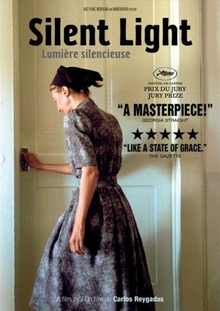
Silent Light is a 2007 film written and directed by Carlos Reygadas. Filmed in a Mennonite colony close to Cuauhtémoc, Chihuahua State, Northern Mexico, Silent Light tells the story of a Mennonite married man who falls in love with another woman, threatening his place in the conservative community. The dialogue is in Plautdietsch, the Low German dialect of the Mennonites. The film was selected as the Mexican entry for the Best Foreign Language Oscar at the 80th Academy Awards, but it did not make the shortlist. The film was nominated for Best Foreign Film at the 24th Independent Spirit Awards. It gained nine nominations, including all major categories, in the Ariel Awards, the Mexican national awards.

Japón is a 2002 film by the Mexican director Carlos Reygadas. It was Reygadas' debut feature, which was shot on anamorphic 16-millimeter film in a 2.88:1 screen aspect ratio.
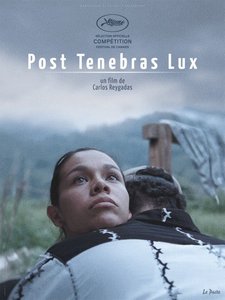
Post Tenebras Lux is a 2012 drama film written and directed by Carlos Reygadas. The title is Latin for "Light after darkness". The film is semiautobiographical, and the narrative follows a rural couple in Mexico, with additional scenes from England, Spain and Belgium; all places where Reygadas has lived. The film competed at the 2012 Cannes Film Festival and Reygadas won the Best Director Award.

The 66th Cannes Film Festival took place in Cannes, France, from 15 to 26 May 2013. Steven Spielberg was the Jury President for the main competition. New Zealand film director Jane Campion was the head of the jury for the Cinéfondation and Short Film sections. French actress Audrey Tautou hosted the opening and closing ceremonies. Actress Kim Novak was named guest of honour and introduced a new restored version of Alfred Hitchcock's Vertigo. The festival poster featured the real-life couple and Paul Newman and Joanne Woodward kissing during the shooting of A New Kind of Love.

Heli is a 2013 Mexican crime drama film directed by Amat Escalante and produced by Jaime Romandía. Featuring newcomers Armando Espitia, Andrea Vergara, Linda González, and Juan Eduardo Palacios, the film premiered in competition for the Palme d'Or at the 2013 Cannes Film Festival. Escalante won the Best Director award at the ceremony. While being appreciative of the film's technical aspects, film critics were divided in their opinion of the film itself. Heli was selected to represent Mexico at the 86th Academy Awards for Best Foreign Language Film, but it was not nominated.
Mantarraya Productions, is an independent cinema production company funded in 1998. On their web page they define Mantarraya as; "... works as a platform for a new generation of filmmakers and has earned a reputation for promoting new talent".
Michael Rowe is an Australian film director and screenwriter.

Michel Franco is a Mexican film director, screenwriter and producer. He is best known for his film After Lucia that won the Prize Un Certain Regard at the 2012 Cannes Film Festival.
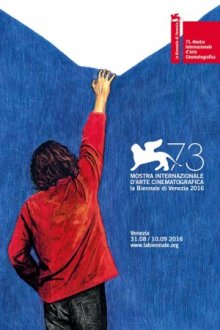
The 73rd annual Venice International Film Festival was held from 31 August to 10 September 2016.
Gabriel Ripstein is a Mexican film producer, director, editor and screenwriter. A producer since 1999, Ripstein has been involved in nine feature films. Two of his productions competed for the Palme d'Or at the Cannes Film Festival: El Coronel No Tiene Quien le Escriba and Chronic. Ripstein also wrote screenplays for Amor a Primera Visa, Compadres, and Busco novio para mi mujer.

The Platino Award for Best Director is one of the Platino Awards, Ibero-America's film awards presented annually by the Entidad de Gestión de Derechos de los Productores Audiovisuales (EGEDA) and the Federación Iberoamericana de Productores Cinematográficos y Audiovisuales (FIPCA).
Piano is an independent film production and distribution company based in Mexico City, started in 2011 by Julio Chavezmontes and Sebastián Hofmann as a platform for innovative filmmakers. It specializes in film production, finance, distribution, and international coproductions.

Julio Chavezmontes is a renowned Mexican producer and screenwriter, winner of the Best Screenplay award at the Sundance Film Festival in 2018 and twice nominated for the AMACC Ariel Award. He has produced more than 20 films, many of which have been screened at the world's leading film festivals, including Sundance, Berlin, Cannes, Venice, and Toronto, among others. His productions have received multiple accolades, most recently the Best Director Award (“Annette”) and the Jury Prize (“Memoria”) at the 2021 Cannes Film Festival.

The 60th Ariel Awards ceremony, organized by the Mexican Academy of Film Arts and Sciences (AMACC) took place on June 5, 2018, at the Palacio de Bellas Artes in Mexico City. During the ceremony, AMACC presented the Ariel Award in 26 categories honoring films released in 2017. The ceremony was televised in Mexico by Canal 22.
Nicolás Celis is a Mexican film producer. He received a nomination for the Academy Awards for best film for his work as a producer in the film Roma, alongside Alfonso Cuarón and Gabriela Rodríguez. For the same film he received four BAFTA Awards, the award for Best International Film at the British Independent Film Awards, two Golden Globes and three Academy Awards In 2017, the producer was named "Talent to watch", by The Hollywood Reporter
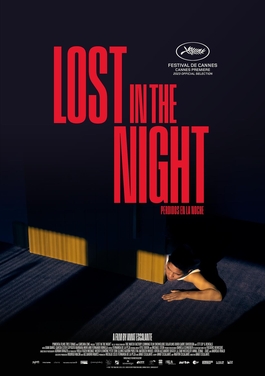
Lost in the Night is a 2023 mystery thriller film directed by Amat Escalante from a screenplay he co-wrote with Martín Escalante which stars Juan Daniel García alongside Ester Expósito, Bárbara Mori, and Fernando Bonilla. It is a Mexican-German-Dutch-Danish international co-production.

